MercoPress. South Atlantic News Agency
Tag: Uruguayan Parliament
-
Saturday, August 23rd 2025 - 09:37 UTC
Uruguay marks centenary of Legislative Palace with new LED lighting

Montevideo inaugurated on Friday a modern lighting system for the Legislative Palace as part of the celebrations marking the building’s 100th anniversary. More than 250 LED lights have been installed on the exterior, featuring energy-efficient technology and automated control.
-
Monday, March 4th 2024 - 10:58 UTC
Argentina and Brazil “blocking” Mercosur's progress, Uruguayan President says
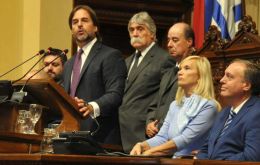
President Luis Lacalle Pou told his country's Parliament Saturday that Uruguay needed to open up to the world. In his last accountability for the year speech as head of state before Parliament, he also singled out Argentina and Brazil for “blocking” Mercosur agreements and insisted on the importance of achieving fiscal goals, low inflation, employment growth, educational transformation, and making the regional bloc more flexible.
-
Wednesday, May 4th 2022 - 09:55 UTC
Uruguay's Senate puts appointment of ambassador to Ankara on hold
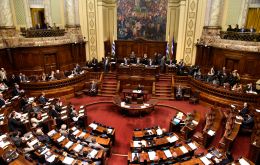
Uruguay's Senate unanimously agreed Tuesday not to move on with its advice and consent regarding the appointment of Hugo Cayrús as the country's next ambassador to Ankara following the embarrassing incidents caused in Montevideo by Turkey's Foreign Minister Mevlüt Çavuşoğlu.
-
Tuesday, September 14th 2021 - 09:23 UTC
Uruguay's Congress hit by coronavirus infections

A few Uruguayan lawmakers tested positive for SARS-Cov-2 forcing 48 people from the national Congress to go into isolation, it was reported Monday.
-
Wednesday, July 7th 2021 - 08:55 UTC
Uruguayan Lower House passes resolution condemning actions by Nicaraguan regime
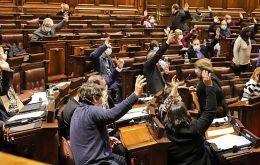
Uruguay's House of Deputies Tuesday passed a resolution condemning the anti-democratic practices of Nicaraguan leader Daniel Ortega, who continues to place opposition politicians under arrest for allegedly planning to overthrow him.
-
Saturday, September 29th 2018 - 14:17 UTC
March for Diversity illuminates Montevideo in favor of LGBT culture
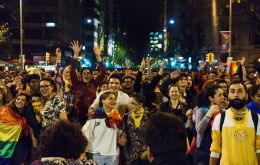
Since 2006, the March for Diversity illuminates every year the most important avenue in Montevideo with a 'comparsa' of thousands of people who dance, celebrate and shout slogans in favor of policies for the rights of the LGBT community. In this year's edition, held on Friday, many marched with yellow and red handkerchiefs, colors chosen by the movements of activists in favor of the so-called trans law, which is under discussion in the Uruguayan Parliament. Diplomatic figures such as the ambassadors of the United Kingdom, the United States and Canada participated in this march with their own posters and slogans.
-
Tuesday, October 28th 2014 - 07:03 UTC
Uruguay's ruling Broad Front headed for parliamentary majority
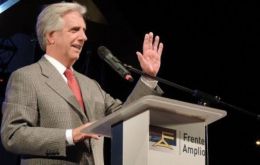
Uruguay's ruling Broad Front coalition, despite pollster forecasts to the contrary, confirmed their dominance of local politics and are likely to enjoy a parliamentary majority, after the Sunday presidential election that left Tabare Vazquez as favorite to succeed José Mujica as head of state.
-
Monday, October 27th 2014 - 06:57 UTC
Vazquez anticipates victory in November and pledges consensuses with other political forces

Uruguay's ruling coalition Broad Front presidential candidate Tabare Vazquez underlined on Sunday night that his political force received the most votes and is in the “threshold” of again having a parliamentary majority; however he anticipated he was willing to work to reach consensuses in political and social issues with other parties or groupings.
-
Saturday, October 25th 2014 - 10:25 UTC
Uruguay's Sunday election and the ruling coalition furious internal dispute
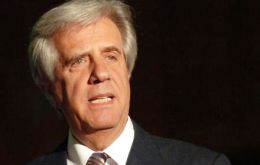
On Sunday 2.6 million Uruguayan registered voters will decide who will be their next president plus 30 Senators and 99 Lower House members. If no presidential candidate makes 50% of valid ballots plus one, the most probable result a run off takes place at the end of November between the two most voted candidates.
-
Wednesday, October 15th 2014 - 07:54 UTC
Mujica running for a Senate seat, since he anticipates a weak government
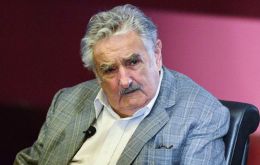
Uruguay president Jose Mujica believes that the next parliament to emerge from the 26 October general election will have a difficult conformation, complicating the government's performance and that is the reason why he accepted to run for a Senate seat.
